Michelle Buteau Wants to Flip the Script
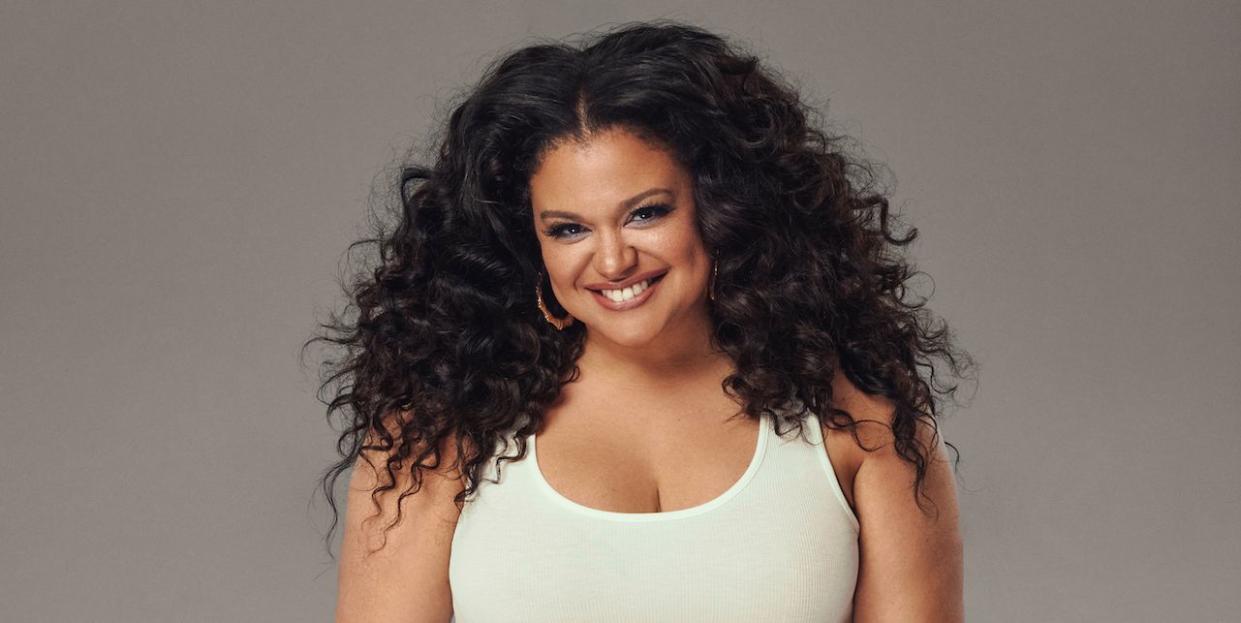
Michelle Buteau has the kind of effervescent energy that feels like a warm embrace. And for the better part of the last two decades, she has brought the same zeal and zest to stage and screen. Buteau has had scene-stealing roles in BET+’s reboot of First Wives Club, Marry Me, Always Be My Maybe, Russian Doll, Tales of the City, and Someone Great, has hosted the American version of The Circle, and headlined her own Netflix comedy special, Welcome to Buteaupia, which won a Critics Choice Award in 2021.
Her latest outing further proves that the comedian-turned-actor has been having a “mo-ment” in recent years. (Longtime fans will be familiar with her distinctive pronunciation of moment.) Created by Buteau and Danielle Sanchez-Witzel and based on the former’s best-selling collection of essays, Survival of the Thickest is a Netflix series starring Buteau as Mavis Beaumont, a newly single, plus-size Black woman who must rebuild her life as a struggling stylist in New York City.
“It was pretty amazing playing Mavis, because I was not single at 38, but I do have a lot of friends that are. So to take what I know from the last 20-some odd years of dating and adulting and put it in these eight episodes was pretty magical, because I don’t know that I would’ve had my shit together [if I was still single] at 38,” Buteau tells Bazaar.com. “So there definitely is [the sense that] Mavis is me and I am Mavis, but would 45-year-old twin mother Michelle do that shit now? No! But a 27-year-old Michelle definitely got gum stuck on a guy’s dick in the back of a taxi, so it’s like, ‘Well, let’s figure out how to put it in Mavis’s story line.’”
On a recent video call from New Orleans, where she was preparing to attend this year’s Essence Festival, Buteau spoke candidly about the real-life inspirations for the new comedy series and creating a love letter for “the fatty baddies and oddy bodies.”
You’ve spoken in the past about how playing the quirky best friend in shows and movies has always been a stepping stone to becoming the heroine of your own story. You’ve also expressed a desire to change how plus-size Black women are portrayed. What are some common tropes or misconceptions about Black and plus-size women that we have seen perpetuated onscreen that you wanted to challenge with this show?
There’s so many things that I wanted to tackle, [such as] Black women supporting each other. Oftentimes, especially in comedy, I know that I’ve experienced [this notion] that there’s only one spot for us at the table, and that’s not what it should be. And what’s that saying? “If you don’t have a seat at the table, make your own table.” Bitch, I got a table and a buffet, so let’s go.
In the plus-size arena, you can’t help who you are, right? It is what it is, so let’s talk about it. I’m not gonna try to lose weight to feed into some unrealistic, patriarchal standard of beauty so [that] I’m attractive to people I’m not even attracted to. I just have to be authentically me, so it’s like: Look, I like sex, my character’s gonna like sex, and we’re gonna show it because I never had that growing up. Big girls were always so thankful someone liked them and paid attention to them—and that’s not what this is. I’m sorry if that’s how you live your life, but you can come over and see how good it is when you actually like yourself. So when Lizzo says, “I did the work,” we’re forced to do the work.
If you are feeling like you don’t like yourself or you don’t fit in, I always say, “It’s not you that needs to catch up to the world; it’s the world that needs to catch up to you.” So the show really is a love letter for the fatty baddies and oddy bodies. Anthony Michael Lopez, who plays Bruce, Garcelle Beauvais’s assistant, is differently abled; he has a prosthetic leg. I remember he came up to me after his first day of working the funeral scene, and he was like, “Thank you so much. Every time I get hired for a project, I’m always some sort of vet that lost his leg in a war, and it’s meant to be sad and not celebrated.” And I’m like, “Dope, we’re gonna put you in booty shorts ’cause people need to know that you love your body, period.”
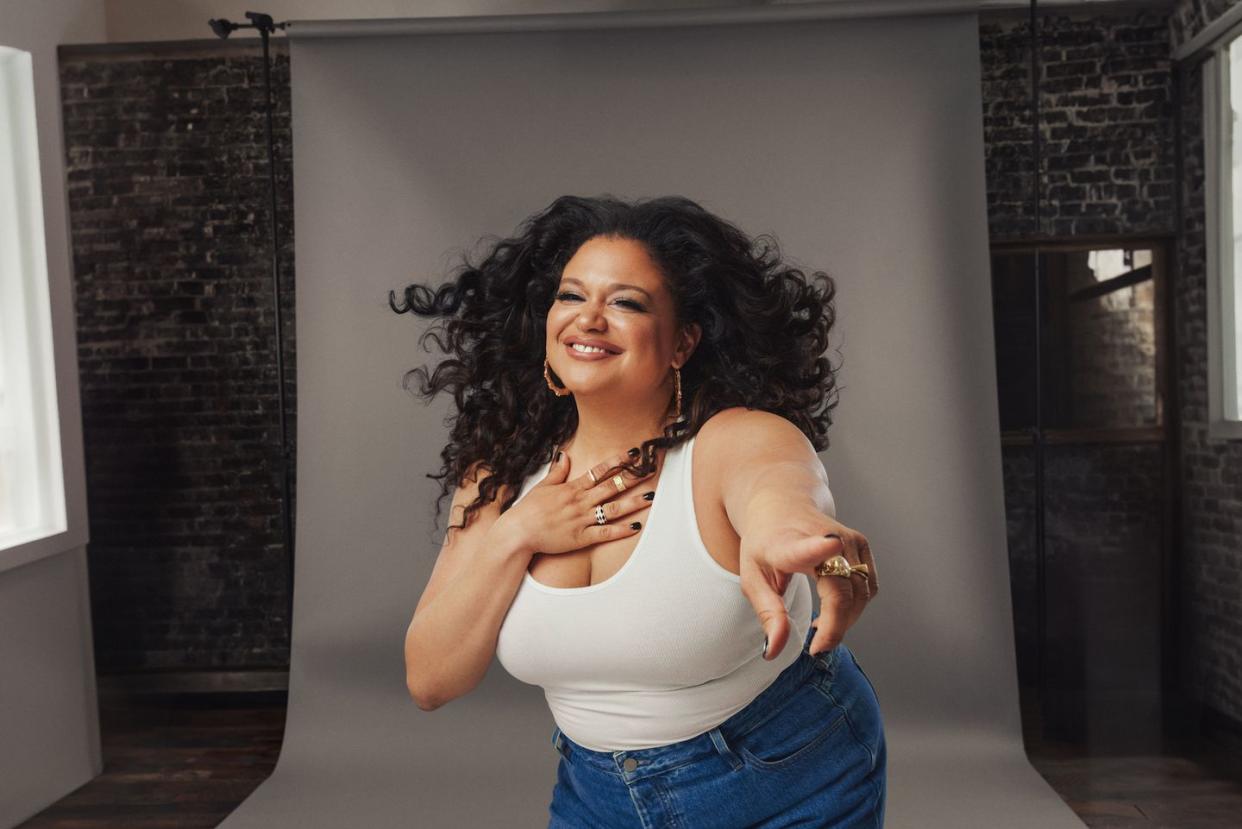
Trying to figure out what she wants out of her life, Mavis naturally finds herself in a love triangle with Jacque (Taylor Selé), the longtime partner who cheated on her, and Luca (Marouane Zotti), a charming Italian man who could represent a new beginning for her in her late 30s. What did you want to accomplish with Mavis’s romantic arc?
I don’t know if you’ve ever been cheated on, but it almost feels like a death. I can only really compare it to a death, because you really thought life was this one way and now life is completely different, and a part of you feels like it’s missing. Most of the women in my family have been cheated on, so I only really know what it looks like to pick yourself up and move on after a betrayal. A lot of people will say, “If I’ve been cheated on, I’m never going back.” But when you’ve put in so much time and you have history, it’s really hard to say [that], especially when you’re at a crossroads, when you’re about to be 40 and middle-aged.
For Mavis, ending up in this love triangle is like, “Are you going to go with someone that’s good on paper, or are you gonna essentially start all over again?” It really makes me sad when people don’t want to just jump off that cliff and take a chance. I always say, “Open your mind, your heart, and your legs to love, ’cause you never know what you’re gonna find.” [Laughs.] “Be safe, though! You’re too cute for bacteria, but still just do it.” I know there was always a moment where I was dating two people casually, and I was like, If I could take his body and [the other’s] mind and make one person, that would be the person. It’s never gonna be perfect. But hopefully, you end up finding somebody that checks all your boxes.
Mavis has a small support network of friends who act as a sounding board—and vice versa—when she needs to talk through career and life decisions. What were the most important considerations you had in mind when you were crafting Mavis’s relationships with Khalil (Tone Bell) and Marley (Tasha Smith) in the writers’ room?
I’ve had a best friend since seventh grade, and that is who the Khalil character is [based on]. It was very interesting, because when I’m talking to people about the show, everybody wants to know: “When are Mavis and Khalil gonna hook up?” And I’m like, “They don’t! They’re just friends!” I don’t know why that’s such a crazy concept for two people to love each other and not want to have sex. After the seventh or eighth time I had that conversation, I was just like, “This feels a little misogynistic, ’cause what I’m hearing is that women are only good for one thing and at some point y’all gotta have sex, and that’s not what this is.”
It was very important for me to write Khalil as close to my friend as possible because my friend is about six foot five, and he is a quiet, artistic Black man and doesn’t always have a space to go to. Sometimes, people find him intimidating the minute he walks in a room, and he couldn’t be more of a gentle giant. I think there is this generalization or this notion, especially from reality shows, that Black men are players and that they want fancy cars and a lot of jewelry—I don’t know what rappers look like anymore. [Laughs.] So [I wanted to create] a guy that takes care of his mom, that is learning how to talk about his feelings in his 30s but in a thoughtful way, and someone that has a best friend that’s a woman.
I wrote the Marley character after a really good friend of mine, and it was really interesting for me to tell her story of realizing that she’s queer in corporate America. Tasha Smith just posted a picture introducing her character in a very intimate moment with one of the women that she has a scene with, and there were over 600 comments that were so homophobic, and I’m like, Oh shit. [Homophobia] is still alive and well. Churchgoing people [are] saying, “We’re all children of God, but you are an abomination, and you’re a sellout. Normalize [relationships between] men and women.” I’m like, Oh, okay, so we have way more work to do. This is what allyship looks like. I hope we can definitely help save or spark some sort of conversation for [real-life] family members at a Thanksgiving dinner or at a wedding, because nothing hurts my heart more than someone not being able to be themselves.
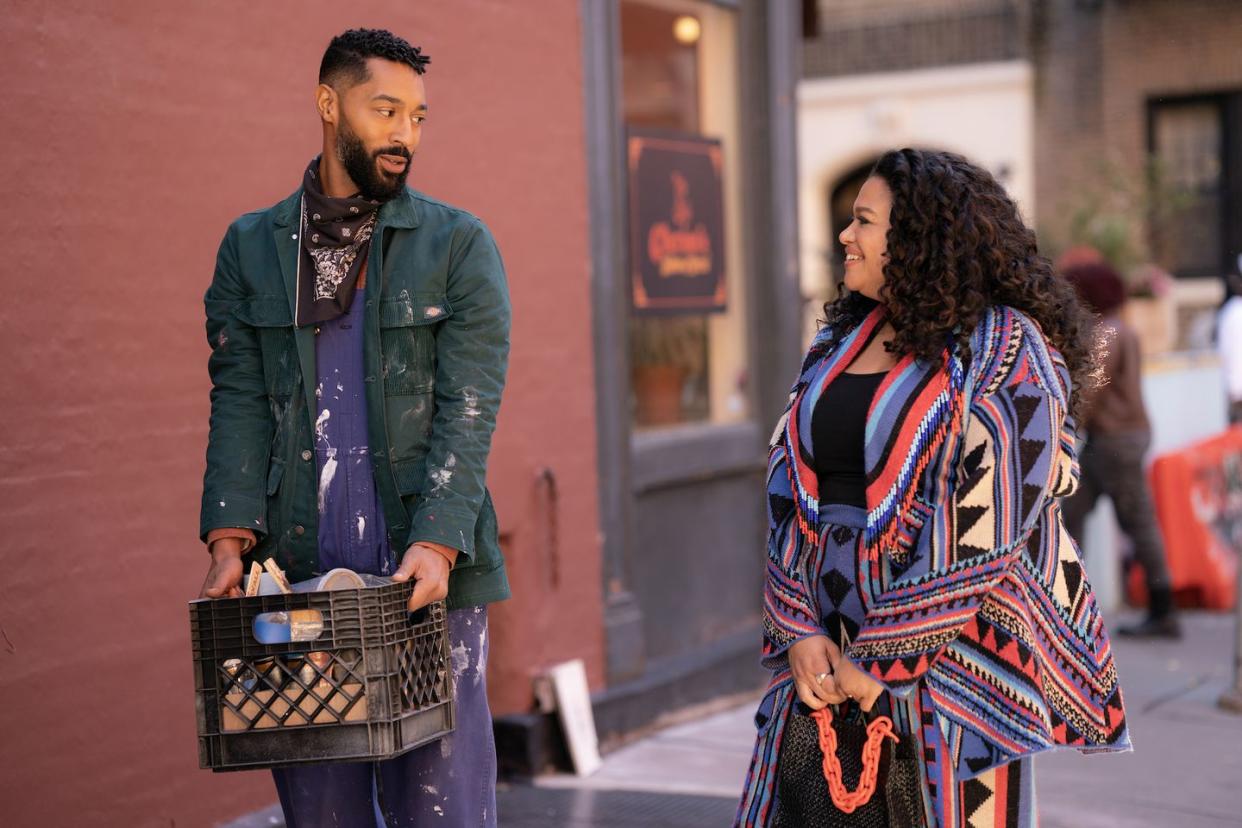
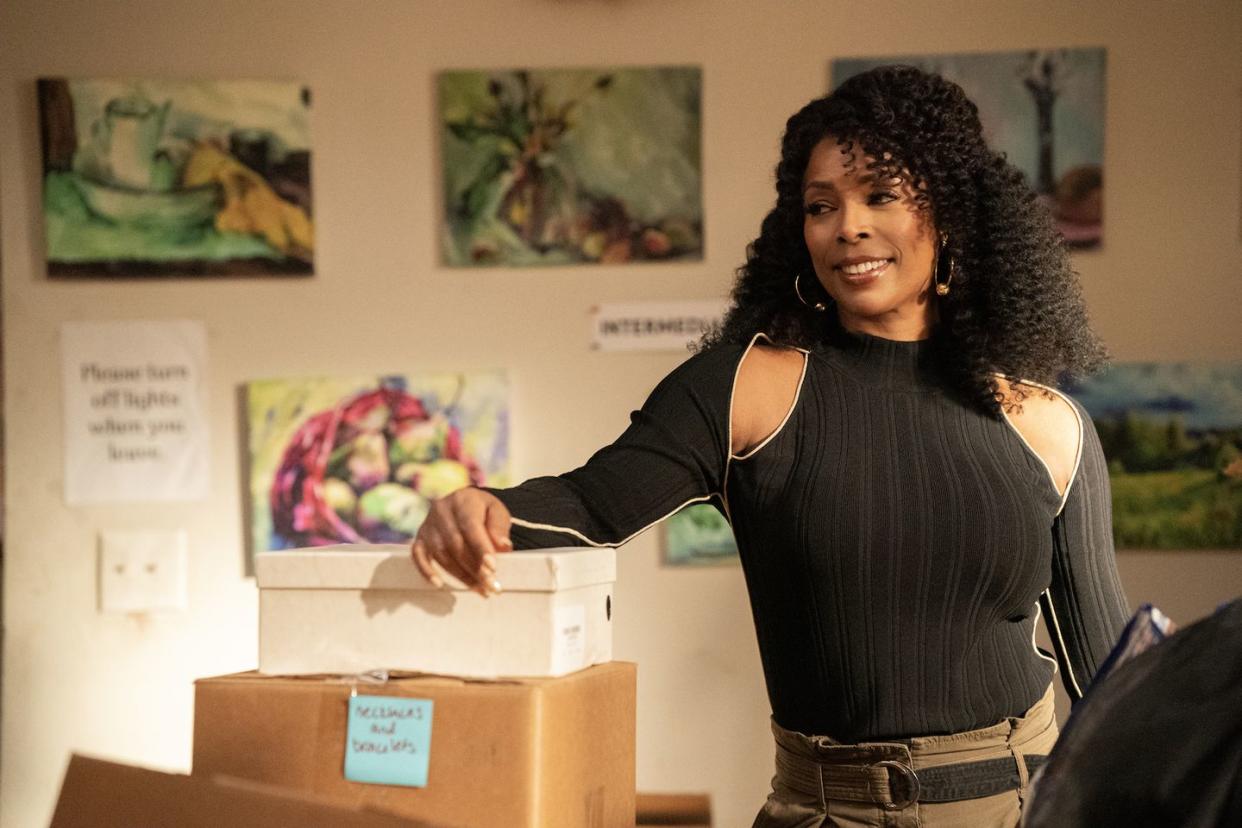
You’ve spoken in the past about reconciling your faith as a devout Catholic with your sexuality, and that is a theme that comes up multiple times throughout the series. How would you describe that part of your journey?
It has not been easy, but I feel like everybody should have their own relationship with religion or God or spirituality. If we were made in His likeness, then we should like ourselves. I don’t really believe that you should not have sex before marriage. I’ve been married for 13 years, and I think you should definitely be in a relationship and know that you have seen everything out there to know that you are in the right place. So I don’t know that my family will necessarily like it, but I also don’t care because I’m not doing it for them. I have four-year-old twins. I want to be the best me, so they know that Mom’s proud of what she does and they should do something that they like.
The fifth episode finds Mavis, Khalil, and his girlfriend, India (Anissa Felix), talking about an instance of racial profiling that occurs when a white woman accuses Khalil of vandalizing the brick wall of a coffee shop he was paid to decorate. That story line captures the virulent sting of racism and how difficult it is to talk about, because those words hurt the same whether you’re a little kid on the playground or a grown adult on the street.
We all have a very different experience with racism, and in the TV version, it’s always going to be big, loud, and violent, but that’s not what this is. We all had the story of the first time we were called the N-word by a white kid at school. And all of our parents did not know how to talk to us about it because there wasn’t a big fight; it wasn’t something that they had to go to school to address.
So what I really wanted to showcase in the episode is that, man, we are out here trying to live and exist, and sometimes it really feels like we are microdosing trauma. We walk in a space, and we don’t even walk the way we would walk with our friends, we aren’t gonna laugh as loud as we normally do, ’cause we know that we’re gonna make other people feel uncomfortable. It’s all the things you could ever be self-conscious of because that’s what society has made us [think about].
When you’re dating someone and some racist shit happens to you, that’s something you guys gotta come together on, because if someone isn’t gonna be like-minded like you—and it doesn’t matter if they’re the same race as you—that relationship is not gonna work. It was really important for us to show that, but we’re like, “How do we make it funny?” We get high!
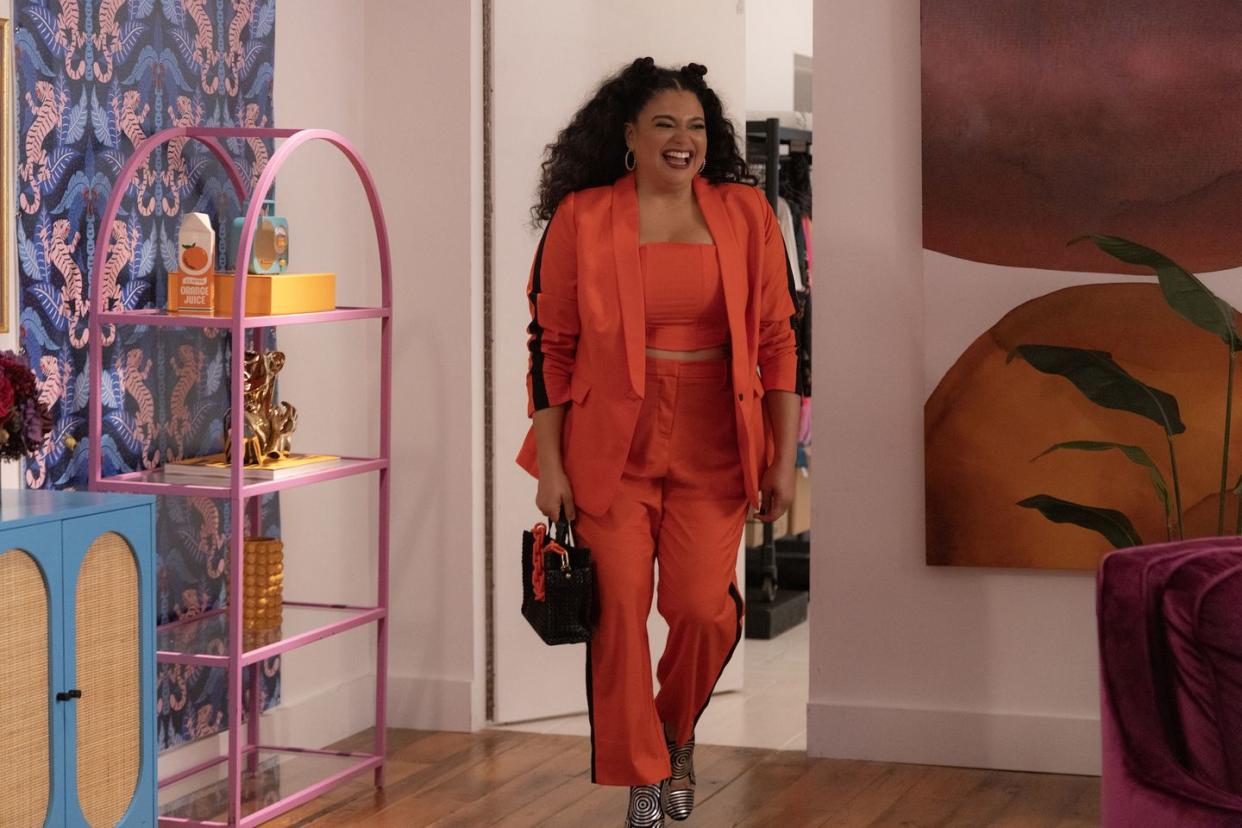
You briefly worked in journalism as a newsroom editor before you decided to try stand-up comedy. How did your upbringing influence your comedic style, and what made you decide to pursue a career in entertainment?
I’m the only child and I went to a lot of different schools, so if I have to self-diagnose myself, I’d be like, “Well, you were just trying to get through the day, Michelle.” I have a really big family of mostly difficult people, so you just navigate those long parties and/or dinners. And by the time I got to the workplace and I was working at local news, I was in a very small edit bay with no windows. I’m like, “I’m a Black person with freckles. I need vitamin D, honey—the sun and the dick.” A lot of writers were like, “You’re so funny, you should do stand-up.”
And when I went to stand-up shows to see these comedians perform for way too much money, they were all sad and broke and couldn’t get laid. I was just like, Bitch, I like sex, I like money, and I’m happy. I wasn’t even sure there was a place for me in comedy, but when I did it, I was like, Oh no, I like this. So I’m so glad I stuck with it, but at the end of the day, it really is about me working through my shit, so you can work through your shit, so we can have a good time together. That is the end goal.
This interview, which was conducted before the SAG-AFTRA strike, has been edited for length and clarity.
You Might Also Like
